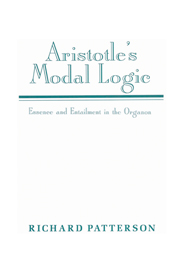Book contents
- Frontmatter
- Contents
- Acknowledgments
- Chapter 1 Introduction
- Chapter 2 The basic modal proposition
- Chapter 3 Syllogisms with two necessity premises
- Chapter 4 Mixed syllogisms: one assertoric and one necessity premise
- Chapter 5 Two-way possibility: some basic preliminaries
- Chapter 6 Two-way possibility syllogisms
- Chapter 7 Aristotle's perfect syllogisms
- Chapter 8 Principles of construction
- Appendix Categorical propositions and syllogisms
- Notes
- Select bibliography
- Index
Chapter 7 - Aristotle's perfect syllogisms
Published online by Cambridge University Press: 14 November 2009
- Frontmatter
- Contents
- Acknowledgments
- Chapter 1 Introduction
- Chapter 2 The basic modal proposition
- Chapter 3 Syllogisms with two necessity premises
- Chapter 4 Mixed syllogisms: one assertoric and one necessity premise
- Chapter 5 Two-way possibility: some basic preliminaries
- Chapter 6 Two-way possibility syllogisms
- Chapter 7 Aristotle's perfect syllogisms
- Chapter 8 Principles of construction
- Appendix Categorical propositions and syllogisms
- Notes
- Select bibliography
- Index
Summary
Aristotle's syllogistic encompasses several groups of syllogisms— the assertoric ones and six or so modal groups (the exact number would be a matter of contention and is not important here). Almost without exception each type (e.g., those with necessary premises and conclusion) contains its own subset of “perfect” or “complete” (teleios) syllogisms, perfect because they are not only valid, but obviously so just as they stand, and another set of imperfect ones whose validity must be demonstrated “by something additional,” usually by reduction to one or another perfect syllogism. Aristotle says relatively little about this perfection, and for the most part the commentators follow him in this. Everyone agrees that he has in mind, at least in part, the psychological feature of obviousness of validity; but some would maintain – and here controversy begins to set in – that for the assertoric case, at least, he also has in mind a single logical principle that is itself obviously valid and that directly entails the perfect syllogisms Barbara, Celarent, Darii, and Ferio. The principle in question is the dictum de omni et nullo: Everything predicated (or not predicated) of all of some group is predicated (not predicated) of everything contained in that group. If Aristotle does have such a principle in mind, the question arises whether he meant it to apply also to perfect modal syllogisms and hence whether he had a single underlying principle that could ground the perfection of all his perfect syllogisms, plain or modal.
- Type
- Chapter
- Information
- Aristotle's Modal LogicEssence and Entailment in the Organon, pp. 206 - 224Publisher: Cambridge University PressPrint publication year: 1995



